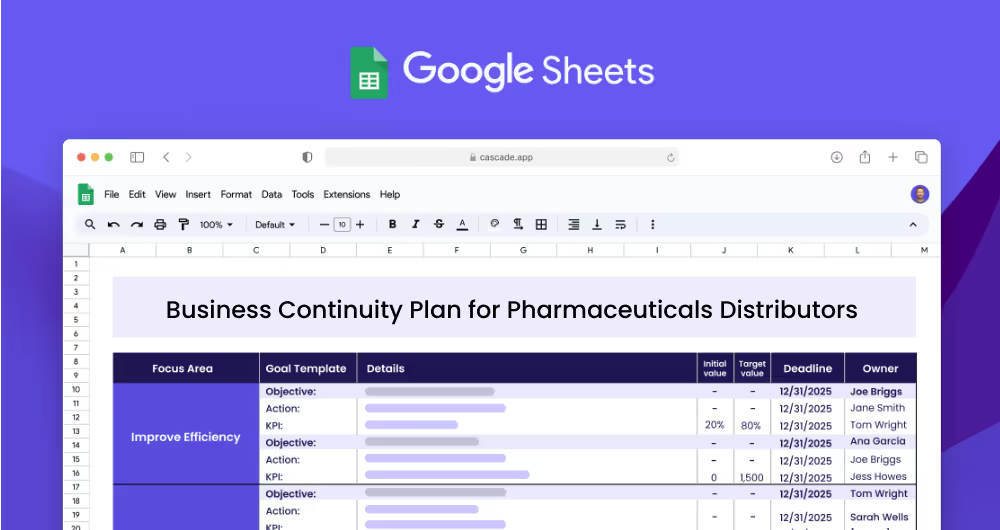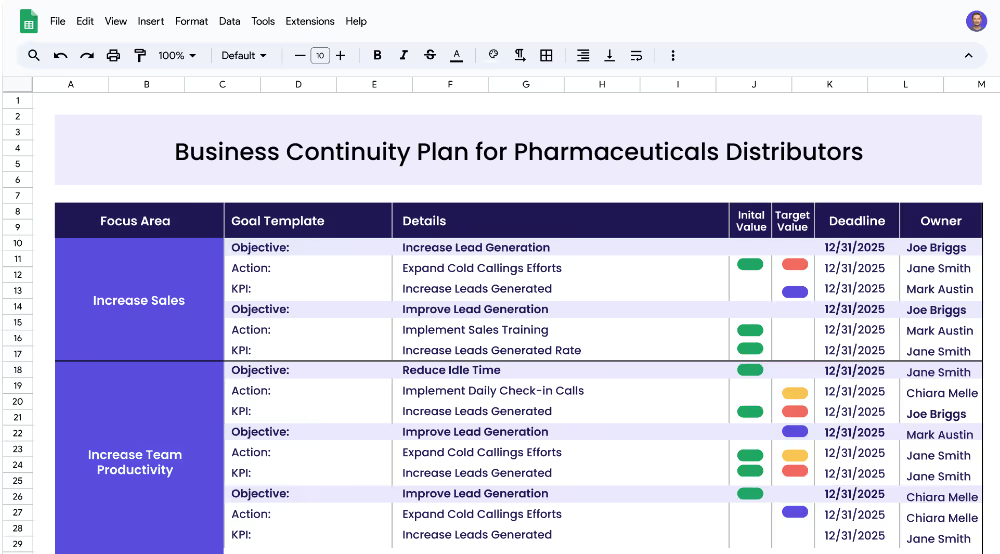A business continuity plan is a plan that outlines how an organization will continue to operate and remain operational during unforeseen events. It typically includes a list of strategies and procedures for responding to a wide range of potential threats and disasters that could affect the business, such as natural disasters, supply chain interruptions, data breaches, and cyber-attacks. For pharmaceutical distribution companies and wholesalers, business continuity planning is essential for ensuring the uninterrupted supply and distribution of pharmaceutical products to healthcare providers and pharmacies.
Each focus area has its own objectives, projects, and KPIs to ensure that the strategy is comprehensive and effective.
This business continuity plan template is designed for pharmaceutical distribution companies and wholesalers to create their own business continuity plans. It covers all the key aspects of risk management, personnel management, and supply chain management, and provides objectives, actions, and measurable targets (KPIs) to help organizations create a comprehensive business continuity plan.
The Business Continuity Plan for Pharmaceuticals Distributors template outlines three key focus areas: Risk Management, Personnel Management, and Supply Chain Management. By defining focus areas, it becomes easier to set achievable objectives, actionable projects, and measurable targets (KPIs) that will help organizations create a comprehensive business continuity plan.
Objectives are specific goals that should be achieved in order to meet the focus area. For example, under the Risk Management focus area, objectives could include establishing security protocols and developing a disaster recovery plan. Under the Personnel Management focus area, objectives could include increasing staff training and improving staff hiring practices. Under the Supply Chain Management focus area, objectives could include establishing backup suppliers and enhancing inventory tracking.
Once objectives have been set, measurable targets (KPIs) need to be defined in order to track progress and determine how successful the objectives have been. KPIs are measurable values that can be monitored in order to determine progress toward the objectives. For example, under the Risk Management focus area, a KPI could be reducing data breaches. Under the Personnel Management focus area, a KPI could be increasing staff understanding of security protocols. Under the Supply Chain Management focus area, a KPI could be improving accuracy of inventory.
In order to achieve objectives and their related KPIs, projects need to be implemented. Projects are actionable actions or activities that need to be completed in order to meet the objectives and KPIs. For example, under the Risk Management focus area, a project could be developing a secure data system. Under the Personnel Management focus area, a project could be providing training to staff on security protocols. Under the Supply Chain Management focus area, a project could be creating a system to track product inventory.
If you're ready to step beyond traditional spreadsheets and elevate your strategy for effective business continuity, Cascade Strategy Execution Software provides a superior platform with real-time updates, centralized collaboration, and automated reporting. Cascade allows your team to quickly align, adapt, and accurately track progress toward your strategic goals. Escape the limitations of manual processes and enjoy enhanced visibility and control over your strategic planning.Sign-up for free or book a demo with one of our strategy experts to propel your strategic execution forward.


